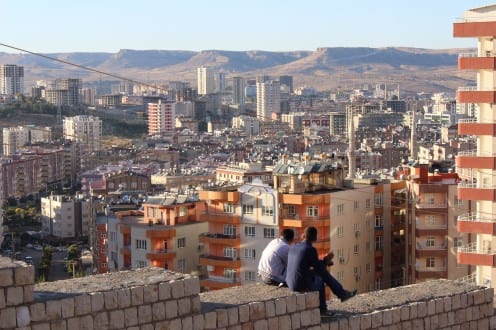The Facebook wall as expression of traditional values
By Elisabetta Costa, on 11 November 2013

Photo by Elisabetta Costa
The inhabitants of Dry Rock Town in south-east Turkey have a mix of social, economic, geographical and ethnic backgrounds. The composition of the town is complex, beginning with a heterogeneous population that has lived here for decades and centuries. Additionally, different groups of rural and urban Kurds, Turks and Arabs came to live in the town more recently for different reasons, contributing to the expansion of the city. At the moment the main social differences of the inhabitants can be explained mainly as a consequence of different levels of urbanization. In fact we can see the people now living in Dry Rock Town as distributed along a continuum from more rural to more urban.
In the last weeks I have worked on the visual analysis of my informants Facebook posts and what has struck me most has been the homogeneity of their Facebook profiles. Although the differences existing in real life between rural and urban people are evident, their Facebook visual materials look quite similar. It doesn’t matter if a woman or a man has grown up in the main city of the region or in a small village, and they have completely different life-styles. Their Facebook profiles have many things in common and their visual materials are not so different from each other. Traditional values of family, honour and women’s modesty are overtly represented.
For example, H. is a young Kurdish woman who works in a highly professional environment, grew up in a big city in southeast Turkey, has male friends, drinks alcohol in restaurants, and eventually will freely choose the person she marries. Her Facebook wall is not so different from the one of S., a woman in her early thirties who grew up in a small town, has very few relationships with non-family members, and that is married to a man who was chosen by her family. In both cases, relatives, family members and traditional habits surface as the main objects of the visual materials that appear on their Facebook walls. Pictures of weddings and family gatherings, and self-portraits with relatives are the most represented images.
The Facebook social network reproduces the social space of the village where there is no space for anonymity. On Facebook everybody is very careful to not damage their own reputation and that of the family because on Facebook everybody knows each other. The practices learned in the anonymous spaces of the big city disappear in the self-representation played out on Facebook. I refer specifically to habits and customs of urban women, such as hanging out with friends, coming home late at night, drinking alcohol, smoking cigarettes, and having intimate relationships before marriage, which are not represented at all on the Facebook wall.
But as written in a previous post, in contrast with the normativity of the public space, the private chats and the private messages of Facebook are exactly the opposite. People do secretly what they can’t do in the offline world: chatting with girls and boys, flirting, finding lovers, new friends and partners, getting in touch with foreigners, playing games, and being politically active.
 Close
Close




